#Pyrrhus of Epirus
Explore tagged Tumblr posts
Text

Fabricius and Pyrrhus, Ferdinand Bol, 1656
#art#art history#Ferdinand Bol#historical painting#ancient history#Ancient Rome#Roman history#Roman Republic#Hellenistic history#Pyrrhus of Epirus#allegory#allegorical art#Dutch Golden Age#Baroque#Baroque art#Dutch Baroque#Dutch art#17th century art#oil on canvas#Royal Palace of Amsterdam
76 notes
·
View notes
Text

Something awakening in the son of Achillies and the son of Agamemnon
#tagamemnon#greek mythology#classics#greek heroes#ancient greek mythology#post the fall of troy#the iliad#the oresteia#this is silly#pyrrhus of skyros#pyrrhus#pyrrhus of epirus#pyrrhus x orestes#orestes#Achillies#agamemnon#orestes and pyrrhus#gay#epirus gang
15 notes
·
View notes
Text
A classic Greek vs Roman situation
#agathocles#greeks vs romans#roman history#greek history#syracuse#sicily#archimedes#greek tyrants#greek tumblr#roman tumblr#italian tumblr#sicilian#king of Sicily#sextus can sext us#sextus pompey#Sextus Pompeius#pompey the great#punic wars#carthage#greece#magna graecia#greater greece#pyrrhus#pyrrhus of epirus#pyrrhic victory#pyrrhic#Pompeius magnus#gnaeus pompey#pompeius#gnaeus pompeius magnus
8 notes
·
View notes
Text
Obverse: Head of Zeus of Dodona, bearded, to left, with crown of oak leaves. Below: Greek letter alpha. Reverse: Dione seated sidewise to left on throne with high double back, her right foot drawn back on a footstool; she wears chiton and high crown, draws her himation about her in raised left hand, and holds a sceptre on right shoulder in lowered right hand. Her hair is represented by beaded lines. Greek inscription at right and left.
---
Dione, in Greek mythology, a consort and, at Dodona in Epirus, a cult partner of Zeus, the king of the gods. Since the partner and wife of Zeus was normally the goddess Hera, it has been conjectured that Dione is an older figure than Hera. Dione was variously described. In the Iliad she is mentioned as the mother of the goddess Aphrodite by Zeus; in Hesiod’s Theogony, however, she is simply identified as a daughter of Oceanus. Other writers have identified her as the mother of Dionysus.
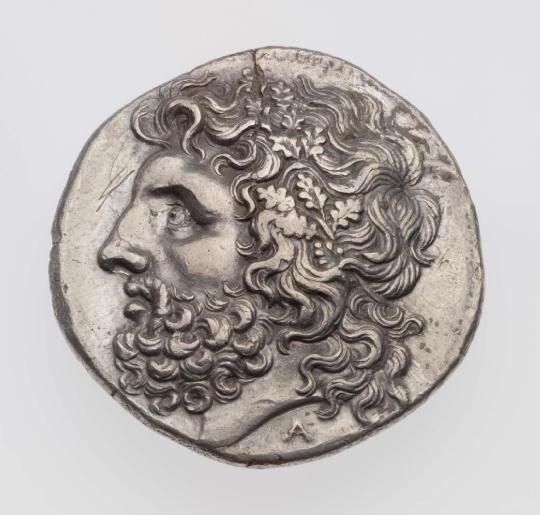
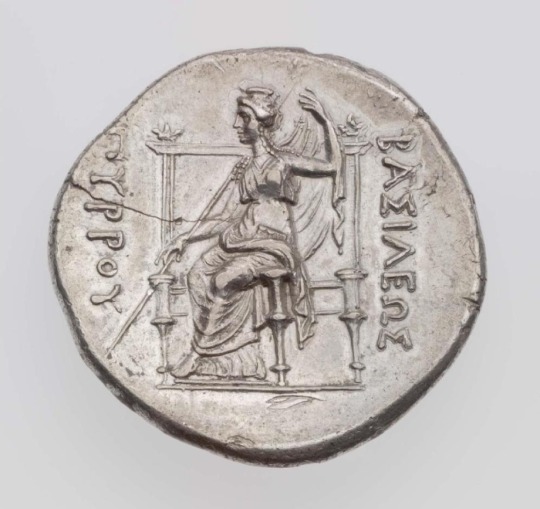
~ Tetradrachm of Lokroi Epizephyriori with head of Zeus, struck under Pyrrhos of Epiros.
Culture: Greek
Period: Early Hellenistic
Date: 280–277 B.C.
Medium: Silver
#studyblr#history#classics#numismatics#coins#greek mythology#ancient greece#hellenistic greece#locri epizefiri#dodona#pyrrhus of epirus#zeus#zeus naios#dione#hera#aphrodite#homer#hesiod#oceanus#dionysus#the iliad#theogony
549 notes
·
View notes
Note
Do you perhaps remember in school where they taught us about women throwing pots from their balconies to prevent their soldiers from coming to their city? I don't remember if it was during the Peloponnese war or somewhere different, but i remember we were laughing in class when the teacher was describing us this scene. 😅
Their soldiers? I know about enemies. This was a must in every Greek school history lesson but why can't I find it anywhere on the Internet????? The only relevant thing I found was when King Pyrrhus was killed by a woman throwing a brick at him from her rooftop in the Battle of Argos. (The Battle of Argos took place in 272 BC and was fought by King Pyrrhus of Epirus - who was trying to expand his influence in the Peloponnese - against Argos, Sparta and Macedonia.)
But the general tendency of women to throw stuff from their rooftops honestly is mentioned so often at school that I don't know why I can't find more info online right now...
35 notes
·
View notes
Text
Fantasy character: "After the adrenaline wore off..."
Me: This fantasy world has knowledge of the endocrine system!
Fantasy character: "It was a pyrrhic victory..."
Me: This fantasy world had a Pyrrhus I of Epirus!
Fantasy character: "She was dressed in a kind of elvensilk onesie..."
Me: This fantasy world has a Gerber corporation!
3K notes
·
View notes
Text
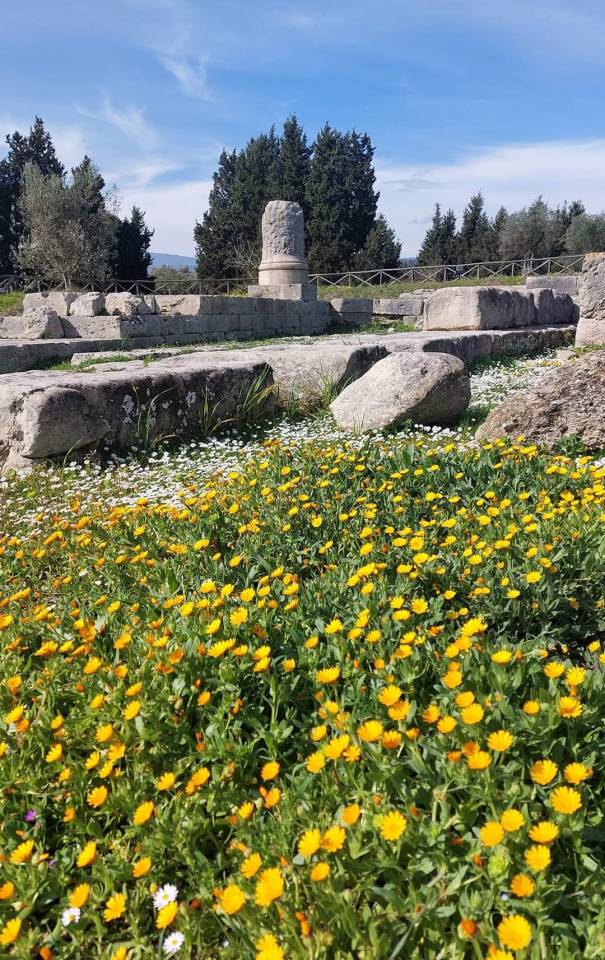

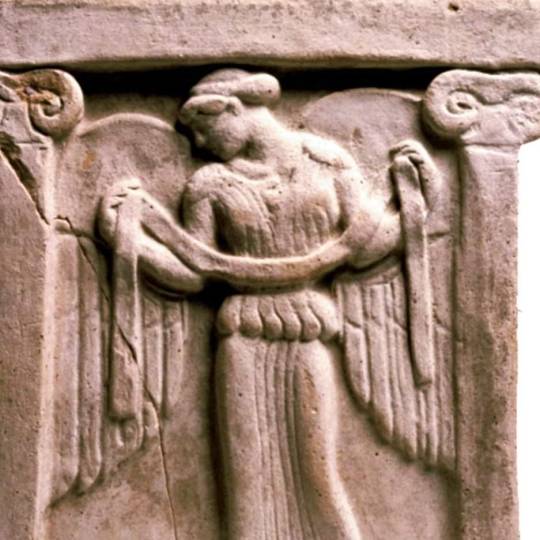
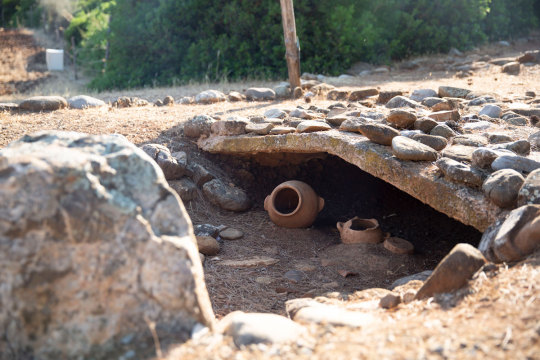
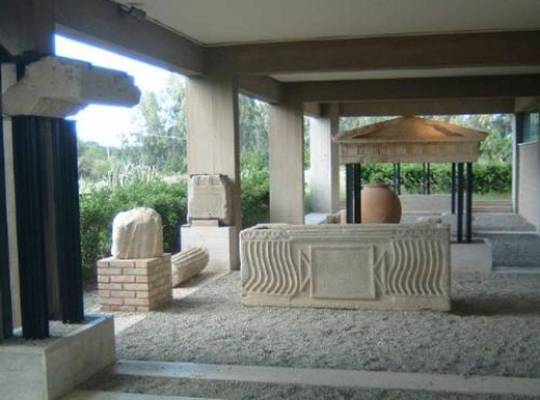
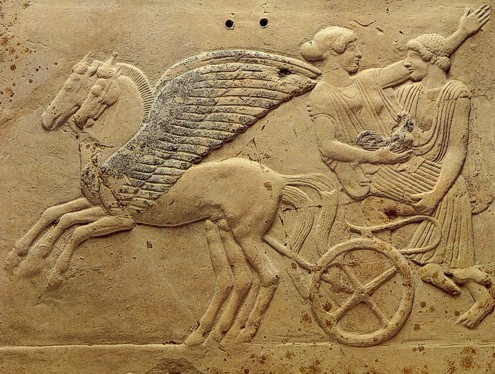

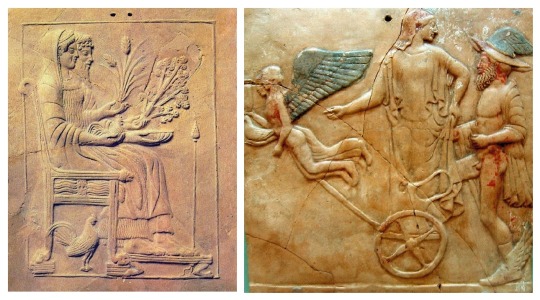
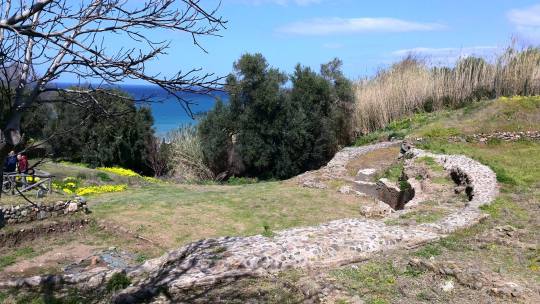

Locri, Calabria, Italy
Locri Epizefiri (Greek Λοκροί Ἐπιζεφύριοι; from the plural of Λοκρός, Lokros, "a Locrian" and ἐπί epi, "on", Ζέφυρος (Zephyros), West Wind, thus "The Western Locrians") was founded about 680 BC on the Italian shore of the Ionian Sea, near modern Capo Zefirio, in Southern Italy's Calabria, by the Locrians, apparently by Opuntii (East Locrians) from the city of Opus, but including Ozolae (West Locrians) and Lacedaemonians.
Due to fierce winds at an original settlement, the settlers moved to the present site. After a century, a defensive wall was built. Outside the city there are several necropoleis, some of which are very large.
Locris was the site of two great sanctuaries, that of Persephone and of Aphrodite. Perhaps uniquely, Persephone was worshiped as protector of marriage and childbirth, a role usually assumed by Hera, and Diodorus Siculus knew the temple there as the most illustrious in Italy.
In the early centuries Locris was allied with Sparta, and later with Syracuse. It founded two colonies of its own, Hipponion and Medma.
During the 5th century BC, votive pinakes in terracotta were often dedicated as offerings to the goddess, made in series and painted with bright colors, animated by scenes connected to the myth of Persephone. Many of these pinakes are now on display in the National Museum of Magna Græcia in Reggio Calabria. Locrian pinakes represent one of the most significant categories of objects from Magna Graecia, both as documents of religious practice and as works of art. In the iconography of votive plaques at Locri, her abduction and marriage to Hades served as an emblem of the marital state, children at Locri were dedicated to Persephone, and maidens about to be wed brought their peplos to be blessed.
During the Pyrrhic Wars (280-275 BC) fought between Pyrrhus of Epirus and Rome, Locris accepted a Roman garrison and fought against the Epirote king. However, the city changed sides numerous times during the war. Bronze tablets from the treasury of its Olympeum, a temple to Zeus, record payments to a 'king', generally thought to be Pyrrhus. Despite this, Pyrrhus plundered the temple of Persephone at Locris before his return to Epirus, an event which would live on in the memory of the Greeks of Italy. At the end of the war, perhaps to allay fears about its loyalty, Locris minted coins depicting a seated Rome being crowned by 'Pistis', a goddess personifying good faith and loyalty, and returned to the Roman fold.
The city was abandoned in the 5th century AD. The town was finally destroyed by the Saracens in 915. The survivors fled inland about 10 kilometres (6 mi) to the town Gerace on the slopes of the Aspromonte.
Today, the modern town of Locri boasts a National Museum and an Archaeological Park, etirely dedicated to the ancient Greek city. The museum preserves the most important findings of the time, such as vases, pinakes, tools used in everyday life, architectural remains from the various excavation area.
Follow us on Instagram, @calabria_mediterranea
#locri#calabria#italy#italia#south italy#southern italy#mediterranean#mediterranean sea#magna graecia#magna grecia#archaeology#archeology#ancient#art#ancient art#history#ancient history#greek#greek art#ancient greece#landscape#italian#italian landscape#landscapes#europe#persephone#olive trees#olive tree#nature#nature photography
207 notes
·
View notes
Text
"Well at least we won," said signifer Piglet.
"Oh bother," muttered legate Pooh. "Another such victory will cost us the war."

218 notes
·
View notes
Text

WIP Wednesday
happy wednesday, everyone! hope you're having a good one! i'm currently in Manchester, visiting a friend and christmas shopping.
thanks for tagging me @that-disabled-princess!
i've already written this entire post once, but tumblr ate it. but i'm nothing if not stubborn.
as well as a snippet from my post-troy wip, you can find below a discussion of ancient greek periods and pregnancies, ancient anatolian food, and a painting.
so first of all, here's a snippet of Hermione, talking about periods:
"Is this not a conversation we should have in private?"
Deidamia laughed, loud as always, but not cruelly. "Oh, they don't mind! Pyrrhus grew up with six aunts and countless girl cousins, he's heard this all before."
I looked at Pyrrhus in surprise, and he shrugged in agreement, expression perplexed, like he didn't see why I was making a fuss about his presence.
"And him?" I jabbed a finger at Helenus.
"I had fifty sisters." He replied, lifting a cup to his lips to unsuccessfully obscure a smirk. Smug bastard. "And I find ginger tea helps more, but apparently that doesn't grow on this forsaken continent." He sighed wistfully. "Gods, I miss rice."
i've spent a lot of time researching ancient greek periods and their attitudes to them. i also spent an inordinately long time looking up alternative names for it, because "period" sounds very modern to me. i landed on menses. there's a surprising amount of discussion of them in this story, because Briseis and Andromache both have pregnancies in their chapters (Andromache has 5 sons and a step daughter, because everyone wants to be descended from Achilles through her. Alexander the Great claimed to be descended from her through his mother, and her grandsons supposedly colonised not only Epirus and Macedonia, but France and Britain too.)
i also had to research what foods ancient anatolia had that ancient greece didn't, for that last line. eventually the only thing i could see was that there is evidence that Troy traded with Asia for rice, while the Greeks knew about it, but didn't bother.
finally, since i'm in Manchester, i can feel this painting of Andromache in the art gallery calling to me. i've seen it three times and it never fails to take my breath away. it's huge in real life, you can really appreciate the details. i could stare at it all day.
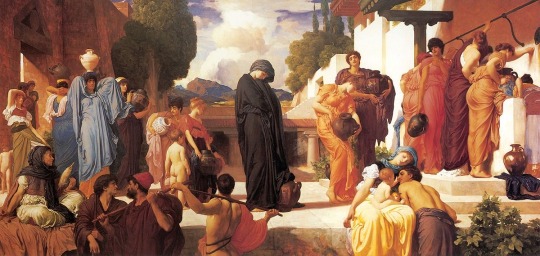
in the Iliad, Andromache begs her husband, Hector, to be careful on the battlefield, as he is the last family she has left, and if he dies there will be nobody to protect her and their baby son, Astyanax. Hector agrees, sharing his fears that if he dies and Troy falls, she will be enslaved and taken to Greece. they tactfully don't mention what would happen to Astyanax, and instead share a sweet moment where he doesn't recognise his father in his helmet, and they laugh through their tears.
this painting is set after that. Hector has died in battle, Troy has fallen, Astyanax was murdered. Andromache is a slave in a foreign land, dressed in mourning black, sent to collect water. around her, life goes on, people bustling about, some stopping to look at her and gossip about the sad fate of the princess of Troy. Andromache ignores them all, standing still at the centre... her gaze fixed on a happy young couple with a baby, lost in their own world.
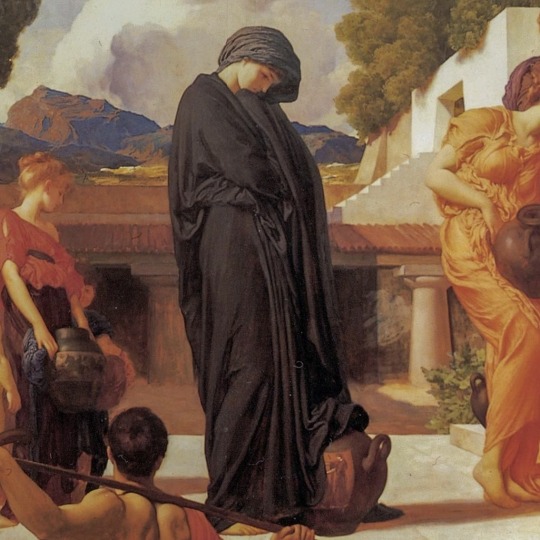
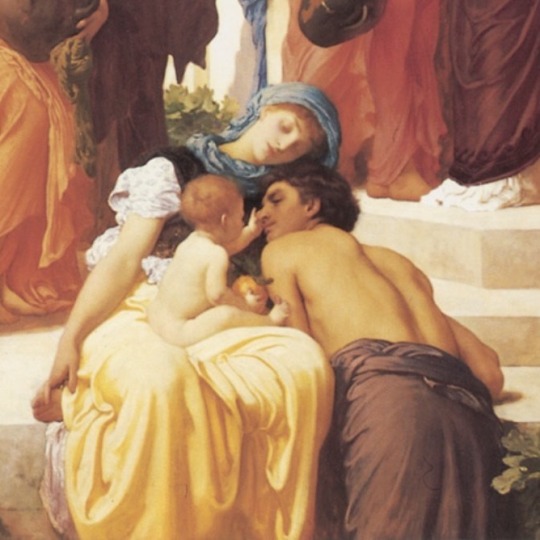
tags: @forabeatofadrum @cutestkilla @run-for-chamo-miles @roomwithanopenfire @prettygoododds @bookish-bogwitch @ic3-que3n @blackberrysummerblog @j-nipper-95 @youarenevertooold @larkral @orange-peony @aristocratic-otter @thewholelemon @alexalexinii @confused-bi-queer @shrekgogurt @comesitintheclover @raenestee @hushed-chorus @you-remind-me-of-the-babe @noblecorgi @shemakesmeforget @ileadacharmedlife @supercutedinosaurs @artsyunderstudy @otherpeoplesheartachept-2 and @ninemagicks
25 notes
·
View notes
Text
Pyrrhus of Epirus remains history’s funniest general
11 notes
·
View notes
Text
I'm not over how Pyrrhus of Epirus died.
A famous and very capable warrior king who, in the middle of a disastrous battle inside a city, was battling a random soldier whose name is not even known.
And then the soldier's worried mother, who was watching the battle from the rooftops, threw a roof tile at Pyrrhus. She not only hit him but also knocked him off his horse and broke his spine.
28 notes
·
View notes
Text

Nothing exemplifies to me more the power and influence of the single individual can have on world history than these two things. The life, and death, of Pyrrhus of Epirus.
#pyrrhus#pyrrhic victory#history#ancient greece#I am of course also referencing the woman cracking his dome with a fucking piece of pottery
16 notes
·
View notes
Text

Epirus' Royal family 6 years after the trojan war. They are a mess godbless I love them so much
#tagamemnon#greek mythology#ancient greek mythology#trojan heroes#greek heroes#classics#post the fall of troy#the iliad#pyrrhus#deidamia#andromache of troy#helenus#hermione of sparta#chaon#molossus#laodamas of troy#amphialus#pielus#pergamus#Andromache x helenus x deidamia#epirus gang#mestor took the photo
69 notes
·
View notes
Text
omg kanye is going for a Pyrrhus of Epirus (319/318–272 BC) inspired look...


"He was short of teeth, in the sense that his upper jaw was one continuous bone, with faint creases marking where gaps should have been"
23 notes
·
View notes
Text
Pyrrhus of Epirus is so funny. Imagine being such a cringefail general that 22 centuries later people still invoke your name to signify absolutely unacceptable loses
7 notes
·
View notes
Text
being driven completely to madness there is some story about someone or other in the wars of the diadochi(????) who was assassinated from a distance by a random archer that was never seen again there is most certainly a painting of this but i cannot for the life of me recall his name... no matter what i google it brings up pyrrhus of epirus as though it would be possible to forget the most embarrassing manner of death that has ever taken place under the sun
2 notes
·
View notes